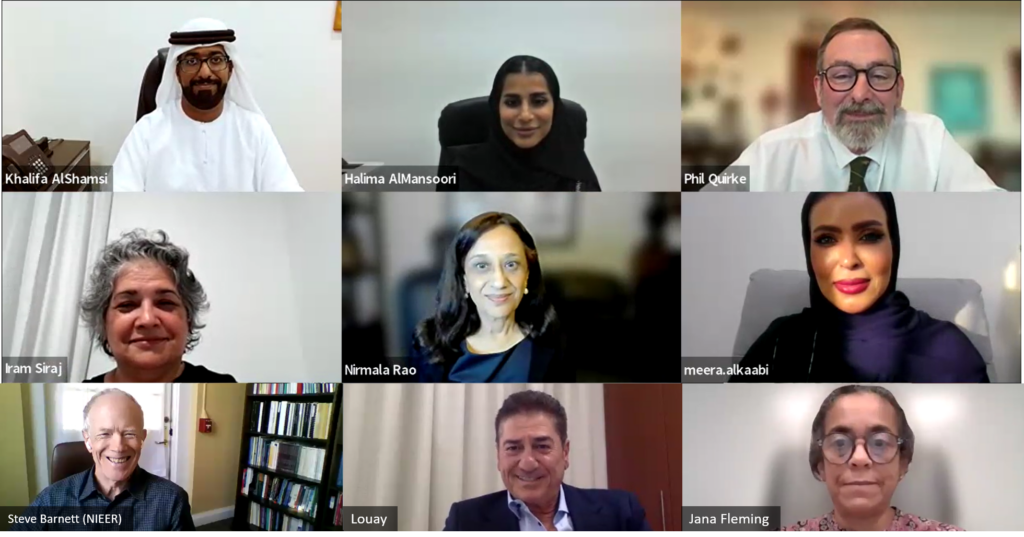The Awarding Committee assessed the annual plan for third Awarding Cycle.
Experts: The Khalifa International Award for Early Learning provides a progressive vision for childhood development.
Amal Al-Afeefi: Emphasizing the most influential global practices in the field of early childhood education
Abu Dhabi: Friday, September 6, 2024
The inaugural meeting of the awarding committee for the 2024-2025 session of the Khalifa International Award for Early Learning took place. At the discussion, the experts discussed many potential areas of focus in the work plan of the current session. Additionally, they deliberated on stimulating strategies to broaden the knowledge foundation for the two disciplines available under this respective field: Best Research and Studies category and Best Programs, Curricula, Teaching Methodologies, and Practices category. The aims include broadening the involvement of the awarding committee in international events and conferences to promote the Award globally, as well as introducing the required nomination processes and criteria for each category. This progressive strategy is poised to usher in a new era of worldwide acknowledgment of early childhood education.
The decision-makers and committee members discussed methods to improve the academic standing of this field at specialized international institutions worldwide, as well as engaging in international conferences and forums focused on early childhood care and education. This strategy involves providing enrichment programs to leverage the knowledge and expertise of previous winners in this field and fostering strong connections with the educational and academic community. These efforts aim to facilitate the exchange of experiences and expertise, ultimately enhancing early childhood care development.
The members of the awarding committee stated that the award successfully promoted academic research to anticipate the future of early childhood. This aligns with the directives of His Highness Sheikh Mansour bin Zayed Al Nahyan, Vice President, Deputy Prime Minister, Chairman of the Presidential Court, and Chairman of the Board of Trustees of the Khalifa Award for Education, who called for the establishment of the Khalifa International Award for Early Learning. The Award has significantly improved the quality of early childhood care at the local, regional, and international levels. It fosters a forward-thinking approach to nurturing and empowering children worldwide by highlighting exemplary practices that promote creativity, innovation, and leadership from an early age.
The Awarding Committee meeting was held via Zoom video conferencing technology and attended by: Professor Stephen Barnett, Founding Director of the National Institute for Early Education Research at Rutgers University in the United States of America, Chairman of the Awarding Committee; Professor Iram Siraj, Professor of Child Development and Education at Oxford University in the United Kingdom; Professor Nirmala Rao from the University of Hong Kong; Professor Jana Fleming, Director of the Early Childhood Development Department at the Salama bint Hamdan Al Nahyan Foundation; Dr. Mira Al Kaabi, Advisor to the Director General of the Abu Dhabi Early Childhood Authority and Head of Academic Affairs at the National Academy for Childhood Development; Dr. Philip Quirky, Executive Dean of Education and General Studies at the Higher Colleges of Technology, former member of the Screening Committee; and Dr. Louay Jeroudi, Advisor to the Khalifa International Award for Early Learning.
Amal Al-Afeefi, Secretary-General of the Khalifa Award for Education, touched on how the meeting examined various strategic aspects of the current session’s plans. These plans aim to strengthen the position of the Khalifa International Award for Early Learning and enhance its academic standing globally. The committee members deliberated on the strategy to promote the Khalifa International Award for Early Learning. They also examined the significant advancements made in the award’s digital infrastructure and the improvements and modernization of the electronic platforms. These improvements facilitate the nomination process by incorporating the most compelling scientific and practical practices in the early childhood education sector.
The committee members discussed developing the mechanism structure for sorting and evaluating the nominated works. The aim is to streamline the process, minimize time and effort, and reinforce the message of the Khalifa International Award for Early Learning in promoting a culture of excellence in childcare worldwide and fostering a learning environment that nurtures creativity in this field. During the meeting, they discussed the contributions of the eight winners in this field and how they have shared their exceptional expertise and experiences in early childhood education. This is crucial for fostering a culture of excellence and motivating other professionals to drive the progress and development of early childhood initiatives and programs. Thus, echoing the vision of the Khalifa International Award for Early Learning field.
